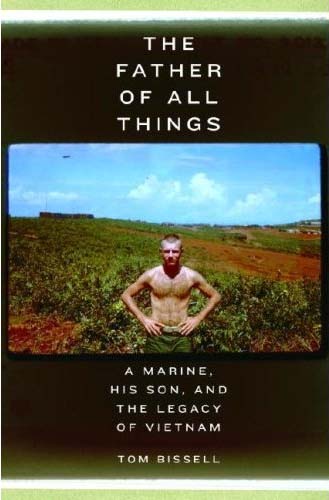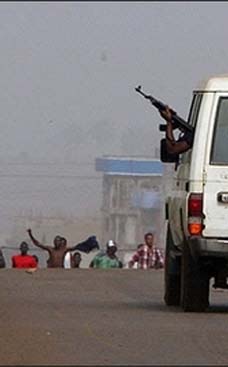
It is a supreme act of authorly self-abnegation, and an utter relief from the solipsistic memoirs that clutter the shelves, that Tom Bissell allows his father to be a far more sympathetic character than he portrays himself to be. After a visit to the Cu Chi tunnels, young Bissell insists on firing an AK-47 at a shooting range the Vietnamese have opened next to the museum, as if unaware that the very sound of the gun would raise horrific memories for his father. '' 'Now imagine,' my father piped up, 'that 20 guys are firing back at you, and people everywhere are screaming.' '' It would be wonderful and heartwarming to report that the Bissells eventually have a transcendent moment of father-son bonding, but this is far too honest a book for that. The distance between them diminishes, but it never really evaporates. John Bissell does have an emotional moment where he puts the war to rest, but it is with a South Vietnamese veteran, not with his son, and I won't ruin it for you by describing it in detail. Tom Bissell seems more frustrated, and incomplete, than his father in the end -- which may well be the fate of his generation, and the next generation, of soldiers' kids. The devastating, messy slog of Bissell's literary journey reminds us that the answer to his question -- ''Why another?'' -- applies not only to books about Vietnam but also to arrogant, futile wars like Vietnam ... and Iraq: Why another? And again, why another? Author Tom Bissell served as a Peace Corps Volunteer in Uzbekistan.
Joe Klein reviews: Tom Bissell's "The Father of All Things
THE FATHER OF ALL THINGS
A Marine, His Son, and the Legacy of Vietnam.
By Tom Bissell.
Illustrated. 407 pp. Pantheon Books. $25.
At the beginning of this fine book, Tom Bissell asks the obvious question: ''More than 30,000 books on Vietnam are currently in print. Why another?'' He's certainly facing a challenge. I've read a great many books about that godforsaken war and written one (no longer in print, sadly), and the literature of Vietnam, both fiction and non, is flat-out excellent. So why another? ''I bring ... only this,'' Bissell writes: ''I have spent most of my life thinking about it'' -- and, more to the point, living with it, because his father, John, was a Marine Corps lieutenant who saw combat in Vietnam and, like so many others, brought the war home. ''What I could not know about my father because of his experience has always fascinated and troubled me,'' Bissell writes. Happily, for father, son and us, Harper's Magazine agreed to send both Bissells back to Vietnam for a visit, in which much, but not everything, is learned and John Bissell comes to terms with his service, if not entirely with his son. This, then, is a book that combines the virtues of distance and immediacy -- the cool perspective that comes from investigating a war that was pretty much over before the author was born and the searing immediacy of being raised by a troubled veteran of that lost war.
Bissell, who has published two previous books, brings more than just a ''lifetime of thinking'' about Vietnam to his task. He also brings a luminous prose style and, perhaps more important, a clear, fresh eye to events that many of us have allowed to slip into the infuriatingly painful past. He has devised a clever structure for the book, which slides back and forth between the Bissell family story and straightforward narrative accounts of the war that are rigorous and convincing.
Bissell's view of the war is supple, complex and a relief from the most recent wave of books about Vietnam, which have been military histories with a conservative, revisionist tilt: authors like C. Dale Walton and Lewis Sorley insist that the United States had won the war militarily by 1972, and could have won it politically with more patience and gumption. Bissell acknowledges that the American military successes were real, but argues persuasively that there was no way to rescue the South Vietnamese government. Indeed, the mere fact of American support helped delegitimize the South -- a lesson that has more than a little resonance in Iraq today. Most Vietnamese didn't know very much about Communism or freedom, but they were quite sure they wanted to be reunited under an indigenous government that had gained credibility over 30 years by resisting foreign armies -- the Japanese, the French and the Americans. Bissell has no illusions about the brutality of the North Vietnamese, and he reminds us that those Vietnamese who supported us in the South suffered greatly when we left. He breaks off the narrative five times to conduct carefully documented ''queries'' into vital questions -- Was Ho Chi Minh a Stalinist? Why was the government of South Vietnam so corrupt? Why did the United States military and government lie so frequently about the war? What was the Soviet Union's goal in Vietnam? Could the war have been ''won''? His post-baby-boom assessments yield valuable, often surprisingly generous reconsiderations of the key players. In the midst of his inquiry into the lies told by the United States government, he discusses Defense Secretary Robert McNamara and his advice to President Johnson: ''McNamara, to his immense credit, stopped lying and then stopped supporting the war altogether. When very few in the U.S. government saw the war's futility, McNamara did. As he said to Johnson in 1967, 'the war cannot be won by killing North Vietnamese. It can only be won by protecting the South Vietnamese.' '' (Another echo of Iraq: McNamara was proposing the same sort of counterinsurgency tactics now being attempted by Gen. David Petraeus in Baghdad.)
Some of Bissell's most affecting passages come when he melds his family saga with narrative accounts of specific events in Vietnam. He opens the book with a long, haunting section about the last weeks of the war in Vietnam and in his parents' home on the Upper Peninsula of Michigan. As emotionally powerful as this is, there is a slight disconnect here: he is describing events in Vietnam that actually happened (stunning, little-remembered details about the American evacuation, including the story of the last two Americans to die, in John Kerry's words, ''for a mistake''), but the events in Michigan -- his father's drunkenness and isolation, the disintegration of his parents' marriage -- are a semifictional, if plausible, recreation of what Bissell imagines his father to have been like during that time. The disconnect has a purpose, though. It presages the utterly human father-and-son awkwardness at the heart of the book: Bissell is clearly mystified, and daunted, by his father. Even when the two of them go to Vietnam together, Bissell insists on infantilizing himself. On the plane going over, he writes, ''what bothered me was the increasingly unsettling sensation of simply being beside my father. Somehow he made me feel physically diminished.'' There is an annoying, if purposeful, clash throughout the book between Tom Bissell's two personas: mature, judicious historian and puerile, needy son -- a discomfort reinforced by the fact that Bissell has tape-recorded most of his interactions with his father and their conversations have the unvarnished, rough-edged dysfunctionality of real life. At one point, John Bissell finally begins to vent -- really vent -- about the war, about how the upper echelons had no idea what was happening to lieutenants like him on the ground:
'' 'Do you know how many colonels died in combat in World War II? Hundreds. Hundreds. Do you know how many died in combat in Vietnam? Hardly any. ... I never saw a general go out on any patrol -- not in a truck, not on foot. ... And when a general does not respect a lieutenant and orders him about summarily, with no idea of the tactical situation, no idea ... well, quite frankly, we began to ignore them.'
'' 'Dad, I'm going to be honest and say you're freaking me out a little.'
'' 'Well, what do you want to talk about? The rights and wrongs of war? I don't know much about that. I don't even know that much about war. Except that I was in one, apparently.' ''
It is a supreme act of authorly self-abnegation, and an utter relief from the solipsistic memoirs that clutter the shelves, that Tom Bissell allows his father to be a far more sympathetic character than he portrays himself to be. After a visit to the Cu Chi tunnels, young Bissell insists on firing an AK-47 at a shooting range the Vietnamese have opened next to the museum, as if unaware that the very sound of the gun would raise horrific memories for his father. '' 'Now imagine,' my father piped up, 'that 20 guys are firing back at you, and people everywhere are screaming.' ''
It would be wonderful and heartwarming to report that the Bissells eventually have a transcendent moment of father-son bonding, but this is far too honest a book for that. The distance between them diminishes, but it never really evaporates. John Bissell does have an emotional moment where he puts the war to rest, but it is with a South Vietnamese veteran, not with his son, and I won't ruin it for you by describing it in detail. Tom Bissell seems more frustrated, and incomplete, than his father in the end -- which may well be the fate of his generation, and the next generation, of soldiers' kids. The devastating, messy slog of Bissell's literary journey reminds us that the answer to his question -- ''Why another?'' -- applies not only to books about Vietnam but also to arrogant, futile wars like Vietnam ... and Iraq: Why another? And again, why another?
















